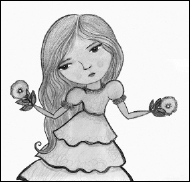How a Mother Weaned Her Girl from Fairy Tales (6 page)
Read How a Mother Weaned Her Girl from Fairy Tales Online
Authors: Kate Bernheimer

After that I could do nothing but sleep, and my head felt heavy and shrouded. Even when I was awake, it was like I was sleeping, or rather more like I was dreaming of sleep, aching for it. I had no thoughts of the library or the woods. All I wanted was sleep, and my mother. She was so kindâbringing me trays of food, quietly placing them on my night table with glasses of milk and some buttered toast. And then, one day as she set the tray down, I saw a tiny body scramble from beneath it. It hopped onto the floor, with lithe, quiet footsteps. Then it zipped up through the air like a bee, and flew into a crack in the ceiling.
When I next opened my eyes, the clock read midnight exactly. I turned on the lamp that my Aunt Sadie had left me when she died. The lamp has a round base that lights up like a moon. It gives off a comforting glow. Sometimes I turn it on and off just to watch the light happen. That night, my mother had left a tray of toast and alphabet soup. I reached for a piece of buttered white toast. I thought about how things had been getting better around the time I met Plute in the woods, but I was starting to feel funny againâexactly the way I'd felt at Happy Acres when the girl had said, “I hate you,” and my shadow girl first appeared . . . I nibbled a corner of toast, and sipped some cold sugary tea, and drifted back to sleep with an old song in my head: “I won't grow up, don't want to go to school, won't learn the golden rule . . .”
When I woke up, my room was all in a haze. I squinted my eyes at all the familiar things: in one corner sat a model of a castle, with a water-filled moat that often leaked; on my desk was a long row of little dolls that were popular then. They came in glass jars; they had name cards attached to them with strings; they looked like teeny beauty queens. (I didn't much like them, now that I think about it.) On the shelves sat my collection of fairy tales from the library. I pulled the books down and pored over their pages. I was looking for a story about a baby in water, a water baby. “The Water Babies”? It reminded me of my dream, or my dream reminded me of the story . . .
But soon, I came across another tale I never had seen in all of my reading. It featured a girl who smiled at everything, but nothing ever smiled back. She was a quiet girl who buried her nose in books. Sometime after she “came into maturity” (as the storybooks often said), a boy did smile at her. She ran home to tell her father and he promptly sent her off to a bad fairy, who locked her in the basement without any books or heating. The bad fairy would slide plates of food under the door. Perhaps the food was magic; her clothes got smaller and smaller upon her, though the meals were meager. And something else: though it was freezing in the basement, she always was warm. One night, when she was so big her clothes had stretched right over her stomach (revealing it to look like a moon), a lightâwhich I understood to be the bad fairy in the form of lightâslid through a crack in the window, down the wall, and into the girl. And the next day, her clothes started to get bigger. And bigger. And bigger. Soon the bad fairy let her go home, where she was greeted with trumpets and dancing. But she never smiled again.
My mother brought me some supper. This time it was crackers and jelly, a tall glass of ginger ale. I ate a few bites. “Is the bad fairy on duty?” I asked. My mother gave me a strange and unpleasant glance, and left the room in a hurry. As I came out of the fog of deep sleep, my body began to have a bad feeling. The shadow girl, the sliver of light. Getting bigger, getting smaller again. A black box, and a coffin. I was covered in sweat. I fell back asleep, and woke much later again, still sweating. Above me hovered that box. It had wings jutting out of its edges. I batted my arms and heard a small whisper: “I won't grow up.”
When I fell back asleep I had the most beautiful dream: me in a meadow, in a gilded storybook frame. Sitting there, I held out my hand. In my palm sat a tiny infant, gazing into my eyes. It stopped my breathâor I passed out or something, because when my mother came to fetch my dinner tray, I had gone paleâwith a very slight blue tinge, just like when I was born. They took me to the hospital, and from there, to a halfway home for young girls in my condition.
Halfway.
You're not home if you're only halfway there. I may have been stupid but I wasn't all the way stupid.
And then my boy came out too soon. On his birthday the sky was covered in clouds. No light to spread into a window and fill him with air. And now, I'm back home, in the house where I myself was a child. I spend all my time lying in bed. I listen to crows. I think of my boy. Up there, on the ceiling, I can see my own shadow.
Of course I find much consolation when my mother brings me a new fairy book from the library or a tray of food for my supper; last night, she made the most adorable pancakes that spelled C A T H Y. Tonight she has promised me alphabet soupâeven to remove the letters I hated. Of course, my sister Meg-Anne complains that I'm freeloading. Poor girl just doesn't realize: nothing is ever free.
C
A
T
H
Y
That's me.

I
'm yours. I am the girl with flowers for hands. It wasn't always this way but when I met you, I knew that I was yours, and so when I planted a garden I made sure to do it just right. It meant considering the angle of light. It meant taking things onâthings you never intended. If things seem a bit gloomy, please don't be sorry. This is really a wonderful thing. Flowers are heavy, like boulders, when looked at just right. Because I am yours I am rosyâand trust me, I am quite strong. Everything dies: I'm not too young to know that particular story. I can hold the entire world up with my flowers. I love you. That is the beginning and end.
The End
Acknowledgments
M
any thanks to all the magazines and books that have given homes to variations of these stories:
Booth Journal
(“The Librarian & Professor Helen C. Andersen”),
Endicott Studio
and
xo Orpheus: 50 New Myths
(“The Girl with the Talking Shadow”),
Monsters: An Anthology
and
The Flying Spaghetti Monster Anthology
(“Babes in the Woods”),
Ninth Letter
(“Tale of Disappearance”),
Puerto del Sol
(“Oh Jolly Playmate!”),
Significant Objects
(“Pink Horse Tale”),
Sonora Review
(“The Old Dinosaur”), and
The Story Prize
(“How a Mother Weaned Her Girl from Fairy Tales”).
I would also like to acknowledge the source fairy tales for some of these stories: “The Old Man” (German), “The Rosebud” (German), “Baba Yaga” (Russian),
Peter Pan
by J. M. Barrie, “How a Husband Weaned His Wife from Fairy Tales” (Russian), and “Babes in the Woods” (Appalachian).
I also must thank the many family members, friends, colleagues, and beautiful students who have supported my fairy-tale habit over the years. I send extra gratitude for this book to Ander Monson, Ann Patchett (Patron Saint of Antibiotic Victims), Aurelie Sheehan, Catherine Eyde, Catriona McAra, Donald Haase, Jack Zipes, Joshua Marie Wilkinson, Joyelle McSweeney, Kathryn Davis, Laird Hunt, Lydia Millet, Maria Tatar, Rikki Ducornet and the Magical Intellectuals, Sabina Murray, Brian Oliu, Timothy Schaffert, and the Walker Art Center.
It is always a dream to work with everyone at Coffee House Pressâreal-life heroes to cherish.
Donna Tartt and Argosy Bookstore provided vital consolations as this book neared completion.
And finally, Brent Hendricks and Xia Bernheimer Hendricks (Angels, First Class): it's a wonderful life with you.
This book is in memory of a horse named Rudyâbeloved family member of Willy and Leeâthough he deserves a happier collection.
Funder Acknowledgments
Coffee House Press is an independent, nonprofit literary publisher. Our books are made possible through the generous support of grants and gifts from many foundations, corporate giving programs, state and federal support, and through donations from individuals who believe in the transformational power of literature. Coffee House Press receives major operating support from Amazon, the Bush Foundation, the Jerome Foundation, the McKnight Foundation, and from Target. This activity made possible by the voters of Minnesota through a Minnesota State Arts Board Operating Support grant, thanks to a legislative appropriation from the arts and cultural heritage fund, and a grant from the Wells Fargo Foundation Minnesota. Support for this title was received from the National Endowment for the Arts, a federal agency.
Coffee House also receives support from: several anonymous donors; Suzanne Allen; Elmer L. and Eleanor J. Andersen Foundation; Mary & David Anderson Family Foundation; Around Town Agency; Patricia Beithon; Bill Berkson; the E. Thomas Binger and Rebecca Rand Fund of the Minneapolis Foundation; the Patrick and Aimee Butler Family Foundation; the Buuck Family Foundation; Claire Casey; Jane Dalrymple-Hollo; Ruth Dayton; Stricker & Bruce Dayton; Dorsey & Whitney,
LLP
; Mary Ebert and Paul Stembler; Chris Fischbach and Katie Dublinski; Fredrikson & Byron,
P.A
.; Katharine
Freeman; Sally French; Jeffrey Hom; Carl and Heidi Horsch; Kenneth Kahn; Alex and Ada Katz; Stephen and Isabel Keating; the Kenneth Koch Literary Estate; Kathryn and Dean Koutsky; the Lenfestey Family Foundation; Carol and Aaron Mack; George Mack; Mary McDermid; Sjur Midness and Briar Andresen; the Nash Foundation; Peter and Jennifer Nelson; the Rehael Fund of the Minneapolis Foundation; Schwegman, Lundberg & Woessner,
P.A
; Kiki Smith; Jeffrey Sugerman and Sarah Schultz; Nan Swid; Patricia Tilton; the Archie D. & Bertha H. Walker Foundation; Stu Wilson and Mel Barker; the Woessner Freeman Family Foundation; Margaret and Angus Wurtele; and many other generous individual donors.

       Â
To you and our many readers across the country, we send our thanks for your continuing support.

Coffee House Press
The mission of Coffee House Press is to publish exciting, vital, and enduring authors of our time; to delight and inspire readers; to contribute to the cultural life of our community; and to enrich our literary heritage. By building on the best traditions of publishing and the book arts, we produce books that celebrate imagination, innovation in the craft of writing, and the many authentic voices of the American experience.
                           Â
Visit us at
coffeehousepress.org
.
Colophon
How a Mother Weaned Her Girl from Fairy Tales
was designed at Coffee House Press, in the historic Grain Belt Brewery's Bottling House near downtown Minneapolis. The text is set in Village Roman.